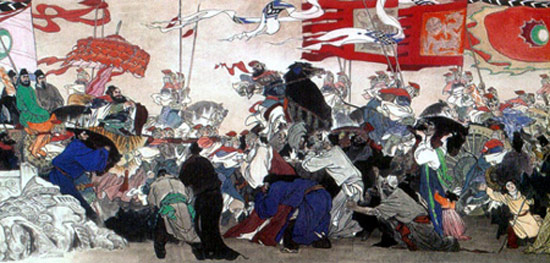 The Tang dynasty, which had been established in 618 AD, was in serious decline. The common man was living under oppressive rule, burdened with excessive taxes and living with severe deprivations. They were seething at the opulent lifestyle of the Emperor and his Governors and this set the stage for a rebellion. The rebellion threw up a leader, Huang Chao, who was a military genius and won many victories over superior and well-armed soldiers. The Huang Chao rebellion took place in the years 874 to 884. The rebellion which lasted about a decade had many crucial stages.
The Tang dynasty, which had been established in 618 AD, was in serious decline. The common man was living under oppressive rule, burdened with excessive taxes and living with severe deprivations. They were seething at the opulent lifestyle of the Emperor and his Governors and this set the stage for a rebellion. The rebellion threw up a leader, Huang Chao, who was a military genius and won many victories over superior and well-armed soldiers. The Huang Chao rebellion took place in the years 874 to 884. The rebellion which lasted about a decade had many crucial stages.
Huang Chao’s Alliance with Wang Xianzhi
The rebellion started with Wang Xianzhi and a band of disgruntled citizens against Emperor Xizong and his military governors. Huang Chao was one of the hundreds who joined Wang Xianzhi’s ragtag army. Due to differences in strategy, the rebel forces split into two and one half was led by Huang Chao. Huang captured Yi Prefecture in spring of 877 AD. Later in the year he formed an alliance with Sang Rang. In 878, his offer of surrender on honorable terms was refused.
The March to Lingnan
Huang Chao marched south and captured many prefectures south of the Yangtze. His attempt to capture Xuan failed as he was attacked by Tang forces during the circuitous mountain march. Due to these reverses, a number of his followers surrendered. Huang then marched south towards Lingnan. Though he captured Lingnan, recognizing his adverse position, Huang offered to surrender to the Imperial authority if he was made military governor of Tianping. The Emperor refused and offered him the position as the Imperial Guard General. This was taken as an insult by Huang and he attacked and captured Guang Prefecture.
The Return to the North
While in the Lingnan region, he lost about 40% of his troops to illness, prompting him to turn north. In 879 Huang captured Hunan’s capital Tan Prefecture. Huang attacked Xiangyang, but was defeated. Huang then went east and attacked E Prefecture but was repelled by Zhang Lin. Huang’s army was also hit by plagues and finding himself cornered, he tried to bribe his way out by giving gold to Zhang and wrote pleading letters to Zhang’s superior Gao.
Gao, wanting to impress the Emperor, returned the extra troops he had been allotted. Recognizing an opportunity, Huang broke off negotiations, attacked and killed Zhang, in the spring of 880. In the summer he captured Xuan Prefecture and moved north across the Yangtze River. Gao, afraid he would lose to Huang, sent an urgent appeal for troops to the Emperor, which had the chain reaction of throwing the Emperor into panic. Due to low morale and rebellion in the Imperial forces, Huang was able to advance easily.
Capture of the Luoyang and Chang’an
In the winter of 880 AD, Huang declared his aim to capture the Emperor Xizong. The Emperor put Qi Kerang in charge of stopping Huang from reaching Chang’an. The ill-equipped and ill-trained Shence Army was put in the field against Huang and were defeated easily. The Emperor abandoned Chang’an and Huang’s forces entered the city.
Huang Chao: Emperor of Qi
In 881, Huang Chao declared himself to the Emperor of Qi. He made Sang Rang, Zhao Zhang, as well as the Tang officials Cui Qui and Yang Xigu chancellors. He failed in trying to persuade the leading Tang Generals to come to his side. The Imperial forces under Zheng regrouped and attacked Qi, but were defeated. In 882, the Emperor appointed Duo to recapture Qi. They captured many areas surrounding Qi and the tide turned in their favor. The battle went back and forth and in 883 AD, Huang was forced to flee eastwards.
Retreat to the East and the End of the Rebellion
In 884, Huang marched east and attacked Cai Prefecture. The city Governor Meng submitted and joined Huang’s forces. Meng was killed in the battle of Chen Prefecture and Huang laid siege to the city, but could not capture it. The Imperial troops regrouped and Huang was forced to withdraw. Huang’s army was caught off guard when they were crossing the Yellow river and suffered a heavy defeat. Huang suffered further military losses and most of his army was annihilated at Yan Prefecture. On July 13, 884, Huang and his family were killed by his nephew Lin Yan, drawing curtains to a rebellion which hastened the end of the Tang dynasty.